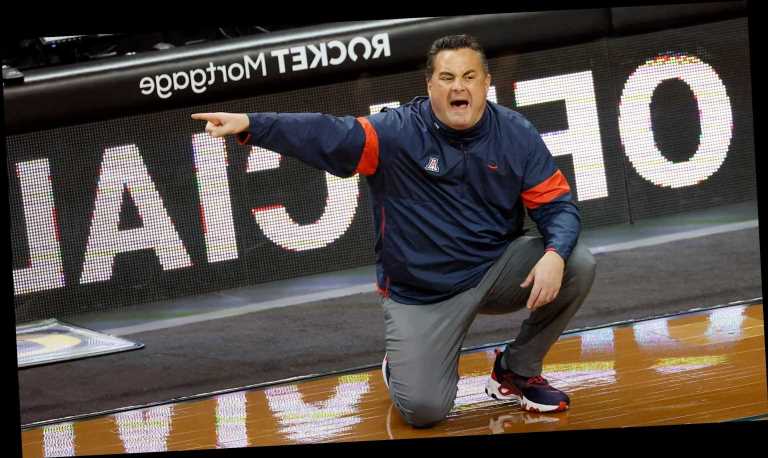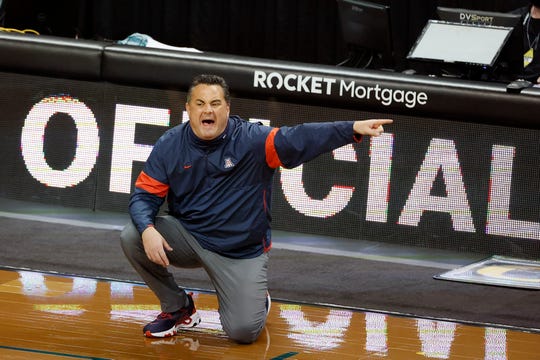Through more than three years of allegations and innuendo about whether head coach Sean Miller would be implicated directly in the corruption that infiltrated the University of Arizona basketball program, the school stood by him. No matter how bad the headlines looked for Miller, no matter how much the ongoing NCAA investigation seemed like a guillotine inching toward his neck, Arizona never backed away from a coach who once seemed destined to return the Wildcats to the Final Four.
But now, at the very moment Miller has gained a degree of vindication, Arizona is paralyzed by dysfunction and indecision. With just one year left on his contract, Miller’s time in Tucson has reached a boiling point, presenting the school with a choice whether to cut ties now or double down on Miller through the end of its NCAA case.
Instead, according to two people with knowledge of the situation who spoke to USA TODAY Sports on the condition of anonymity due to the sensitivity of the situation, Arizona is doing nothing.
Since Arizona’s season ended March 1 due to a self-imposed postseason ban, it has in essence created a standoff designed to either get Miller to walk away from the last $1.5 million he would be owed if fired or come back next season while the clock runs out on his contract — a situation that practically never happens at the Power Five level.
Sean Miller has a 302-109 record in his 12 seasons at Arizona. (Photo: Soobum Im, USA TODAY Sports)
“There’s no communication at all” between Miller and the school’s administration, one person with knowledge of the matter said.
Though Arizona president Dr. Robert Robbins stated publicly in recent days that he wants Miller to return as coach next season, he communicated in a brief meeting last week that he couldn’t get a contract extension approved by the school’s Board of Regents and left Miller with the impression that Robbins would prefer a parting of ways, according to one of the people, who is familiar with Miller’s thinking.
But even if Robbins wants to move Arizona past the Miller era, doing so without alienating some of the school’s biggest athletic boosters who are loyal to Miller or further burdening his cash-strapped athletic department won’t be easy.
COACHES COMPENSATION: In bizarre season, coaches with lower pay making NCAA Tournament impact
TOURNAMENT TIME: Breakdowns of men's college basketball conference tournaments
At this point Miller does not intend to resign, according to one of the people, and the uncertainty over his punishment from the NCAA eliminates him from getting hired elsewhere in college basketball during this cycle.
At the same time, the two people told USA TODAY Sports that Miller is conflicted about a 2021-22 season without some kind of signal of support from the school, even a school-friendly token extension that would be easy to get out of.
Not only would daily speculation about Miller’s future consume all the oxygen next season, but recruiting would basically grind to a halt. And with the NCAA about to grant every player a one-time free transfer, there’s no guarantee Arizona’s current roster — which projects to be in the preseason top 25 — would come back in tact. Most coaches would rather just get fired than try to keep that circus together.
It’s hard to see the upside for Arizona in that situation, either. If Miller comes back next season on the last year of his contract, the smoke clears from the NCAA investigation and the school decides that keeping him long-term is their best option, they’ve unnecessarily kneecapped his rebuilding job. By the same token, if they let Miller coach next year and then get rid of him, the new coach inherits a decimated roster, no recruiting class and the brunt of whatever NCAA sanctions are imposed without the kind of head start in 2021-22 that might be valuable.
Hanging over all of this is uncertainty about when the NCAA is actually going to rule on Arizona’s case. Currently, it’s in the hands of the new Independent Accountability Resolution Process (IARP), the off-ramp where complex NCAA cases are handled. But the IARP has been moving at a glacial pace, and there are other FBI-related cases (like Kansas’) that are ahead of Arizona in the pipeline. It might take even another year before the case gets resolved.
So here’s the part that’s hard to figure: If Arizona has already come this far with Miller, why would it tuck and run now?
Though the school only made its NCAA Notice of Allegations public Friday after a judge ordered it to be released, Arizona officials have known the scope of the charges for months.
In totality the allegations are heavy, with five Level 1 (most serious) violations, ranging from academic fraud orchestrated by former assistants to former assistant Book Richardson accepting bribes to steer players toward certain agents. It’s serious stuff, and Arizona is likely going to end up with significant penalties, particularly given the public pressure on the NCAA to make hay out of the FBI investigation that uncovered all kinds of college basketball corruption.
But the only charge directed at Miller specifically was the catch-all NCAA rule that presumes head coaches are responsible for violations committed by their assistants and failing to monitor Richardson’s relationship with Christian Dawkins, the middleman who got caught up in the FBI’s sting operation into college basketball recruiting.
For Miller, just as notable was what didn’t appear in the Notice of Allegations.
No mention of Deandre Ayton, who was the subject of an explosive ESPN report in 2018 claiming, according to an unnamed person familiar with the FBI investigation, that Miller was caught on a wiretap discussing a $100,000 payment with Christian Dawkins. Miller strongly denied that, saying he had “never discussed” paying Ayton with Dawkins.
There was also no mention of point guard Jahvon Quinerly, who de-committed from Arizona after an unnamed player matching his description appeared in FBI documents allegedly accepting $15,000 from Richardson. Quinerly was later cleared by the NCAA.
There was no mention of Brian Bowen or Nassir Little, players that defendants in the case said Arizona had been willing to pay for.
There was no mention of the video played during Dawkins' 2019 trial of a conversation with an undercover agent in which Dawkins alleges Miller had knowledge of illegal recruiting.
After all the mud thrown at Miller over the past three-plus years that Arizona chose not to act on, what was the NCAA really able to pin on him at the end of the day? Not that much.
To be clear, none of that proves Miller’s innocence. But when you look at coaches who ran afoul of NCAA rules and got second chances from Bruce Pearl to Kelvin Sampson to Rick Pitino, there’s absolutely nothing in the Notice of Allegations that would end Miller's career.
Frankly, it's absurd Arizona didn’t just e-mail the document to every college basketball reporter in the country and instead fought its release in court.
Had Arizona fired Miller the moment the Richardson was arrested, it would have made sense. If they’d gotten rid of him when wiretaps started getting played in court and his name started coming up on the witness stand, it would have made sense.
At the time, though, Miller had been to three Elite Eights and two Sweet 16s in his first eight seasons. His track record as one of the game’s elite coaches made him worth standing by.
Now, with no new evidence against him and a Notice of Allegations that isn’t nearly as bad for Miller as many expected, it looks like Arizona is growing cold on him because of his recent record.
The cloud of investigation at Arizona has undeniably made recruiting more difficult, a reality that has played out with Miller focusing heavily on transfers and foreign players. Still, in a perverse way, it's been an impressive coaching job. Arizona went 17-9 this year, played hard to the very end despite no postseason carrot and could return eight of its top nine players next season.
At this point, it’s hard to tell whether Robbins is more upset about the scandal or the fact that Arizona hasn’t been a true contender for the past few years.
But once the school had the full scope of the allegations in hand last fall, it should have already had a gameplan in place to either show support for Miller or fire him the minute Arizona’s season ended. Instead, the past 10 days have played out in an awkward limbo, leaving everyone involved unsure of the resolution.
After three years of fighting back all kinds of allegations about how its program was run under Miller, Arizona has finally come to the moment where there’s a path toward conclusion. One way or another, it’s time for decisions to be made.
Source: Read Full Article






